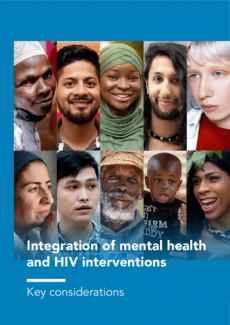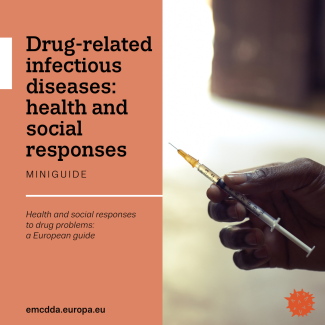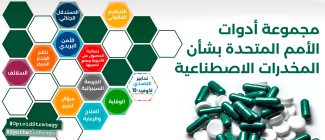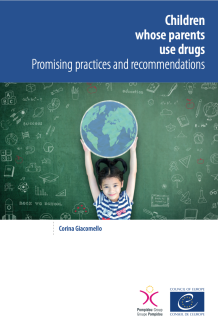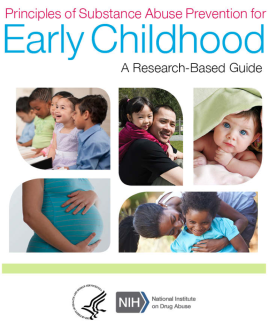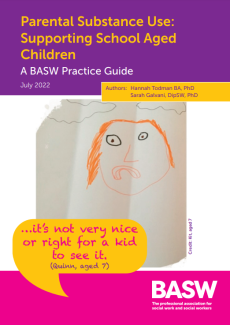
Ara
Young People and Alcohol, What do we know and what can we do about it?
This webinar was hosted by the HSE Health and Wellbeing Alcohol Programme as part of EU Alcohol Awareness Week.
The panel of speakers will discuss the statistics around alcohol use among adolescents and young people in Ireland and the...
HIV and Substance Use: Reading List
World AIDS Day takes place in December each year. This reading list contains a list of research, publications and resources for practitioners relating to HIV/Aids. We also have a network dedicated to HIV and HCV where you can find a...
Centre for disease control prevention factsheets: HIV and substance use
Sharing needles, syringes, or other drug injection equipment—for example, cookers—puts people at risk for getting or transmitting HIV and other infections.
In addition to being at risk for HIV and viral hepatitis, people who inject drugs...
Ending Inequalities for People who Use Drugs: How the Global HIV Response can Transform Drug Policy
This side event for the 65th Commission on Narcotic Drugs was originally presented on 14 March, 2022. Organised by INPUD, it was co-sponsored by Médecins du Monde, UNAIDS, UNODC HIV/AIDS Section, the Netherlands and Australia.
In 2021...
HIV and people who use drugs: Factsheet
The 2021-2026 Global AIDS Strategy has bold and critical new targets on realizing human rights, reducing stigma, discrimination and violence and removing harmful punitive laws as a pathway to ending inequalities and ultimately ending AIDS.
...Key considerations to integrate HIV and mental health interventions
A new publication by UNAIDS and the World Health Organization (WHO) emphasizes the importance of integrating HIV and mental health services and other interventions, including linkages to social protection services, for people living with...
Responding to drug-related infectious diseases: EMCDDA mini guide
Sharing drug injecting equipment increases the risk of transmitting and acquiring blood-borne infections, such as HIV and hepatitis B and C. While hepatitis C is the most prevalent blood-borne viral infection among people who inject drugs...
Disruptions to U.S. local public health’s role in population-based substance use prevention and response during COVID-19
Background
COVID-19 dramatically limited the scale and scope of local health department (LHD) work, redirecting resources to the response. However, the need for essential public health services—including substance use prevention—was not...
Brief counselling by a doctor can reduce drinking
A new systematic review and meta-analysis has found that alcohol-targeted brief interventions (short, structured, one-to-one conversations about drinking designed to motivate changes in risky behaviour) delivered in doctors’ offices and...
مجموعة أدوات الأمم المتحدة بشأن المخدرات الاصطناعية
تدعم مجموعة أدوات الأمم المتحدة بشأن المخدرات الاصطناعية المجتمع الدولي في تنفيذ تدابير استجابة شاملة لمواجهة مشكلة المخدرات الاصطناعية.
وضعت مجموعة الأدوات استجابة لقراري لجنة المخدرات 8/61 (2018) و4/62 (2019) اللذين دعيا مكتب الأمم...
Children whose parents use drugs: Promising practices and recommendations
This report focuses on children growing up in families affected by drug and alcohol dependence, as well as on the services, programmes and practices that help to protect childhood and guarantee children’s needs while, at the same time...
Prevention Topics Page
Drug prevention approaches range from those that target society as a whole (environmental and universal prevention) to interventions focusing on at-risk individuals (indicated prevention).
The main challenges are in matching these...
Principles of Substance Abuse Prevention for Early Childhood
This guide, intended for parents, practitioners, and policymakers, begins with a list of 7 principles addressing the specific ways in which early interventions can have positive effects on development; these principles reflect findings on...
Substance use prevention 'back to basics'- Reading list
Earlier this month, Jeff Lee, senior consultant to ISSUP, delivered two webinars that reviewed what prevention of substance abuse entails. The webinars were intended to be a "back to basics” for anyone working in the prevention field that...
Youth Assessment Tool
This assessment tool can be used by any health and social services and programs that serve young people, including substance use services, mental health services, youth treatment services, harm reduction services, youth shelters, community...
Correction: Interdisciplinary collaboration in the treatment of alcohol use disorders in a general hospital department: a mixed-method study
Background
Interdisciplinary collaborations (i.e., where various disciplines work coordinated and interdependently toward shared goals) are stated to yield higher team effectiveness than multidisciplinary approaches (i.e., where various...
Parental Substance Use: Supporting School Aged Children (BASW Practice Guide)
Children living with parents who use substances are a group of children who are overlooked in legislation, policy and practice.
This guide draws on research that puts children’s voices front and centre.
Findings from safeguarding practice...
Registration opens for European Drugs Winter and Summer Schools 2023
The EMCDDA and the University Institute of Lisbon (ISCTE-IUL) are delighted to open registration today for two upcoming joint events in 2023: the European Drugs Winter School (EDWS) and the European Drugs Summer School (EDSS) (1)(2).
EDWS...
Mental Health and Substance Use: Reading List
Mental health and substance use issues are commonly linked, and it is important that practitioners are skilled and knowledgeable in identifying and working with the potential challenges an individual may be facing. For World Mental Health...
Global trends in opioid medicine availability
This webinar presented the latest global and regional trends in the use of opioid analgesics and explore issues related to availability.
Around the world the consumption of opioid analgesics has been increasing, yet millions of people...
Share the Knowledge: ISSUP members can post in the Knowledge Share – Sign in or become a member





